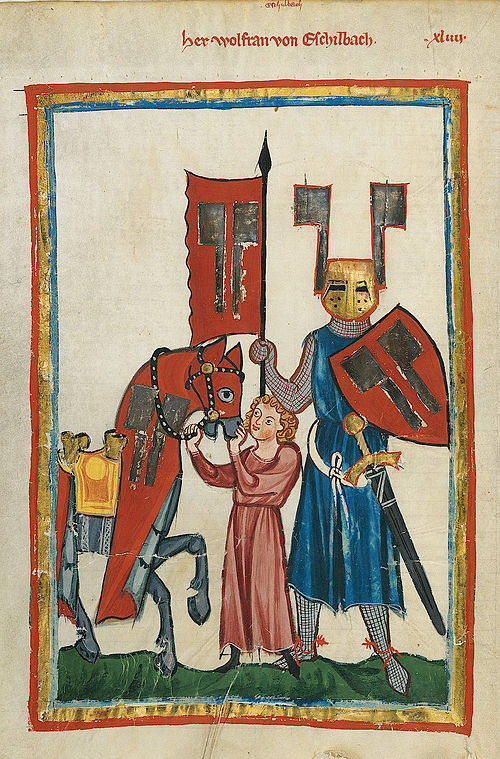Esquirenoun
A lawyer.
Esquirenoun
A male member of the gentry ranking below a knight.
Esquirenoun
An honorific sometimes placed after a man's name.
Esquirenoun
A gentleman who attends or escorts a lady in public.
Esquirenoun
(archaic) A squire; a youth who in the hopes of becoming a knight attended upon a knight
Esquirenoun
(obsolete) A shield-bearer, but also applied to other attendants.
Esquirenoun
(heraldry) A bearing somewhat resembling a gyron, but extending across the field so that the point touches the opposite edge of the escutcheon.
Esquireverb
To attend, wait on, escort.
Esquirenoun
Originally, a shield-bearer or armor-bearer, an attendant on a knight; in modern times, a title of dignity next in degree below knight and above gentleman; also, a title of office and courtesy; - often shortened to squire.
Esquireverb
To wait on as an esquire or attendant in public; to attend.
Esquirenoun
(Middle Ages) an attendant and shield bearer to a knight; a candidate for knighthood
Esquirenoun
a title of respect for a member of the English gentry ranking just below a knight; placed after the name
Esquirenoun
a polite title appended to a man's name when no other title is used, typically in the address of a letter or other documents
Esquirenoun
a title appended to the surname of a lawyer (of either sex).
Esquirenoun
a young nobleman who, in training for knighthood, acted as an attendant to a knight.
Esquirenoun
an officer in the service of a king or nobleman.
Esquirenoun
a landed proprietor or country squire
Esquire
Esquire (, US also ; abbreviated Esq.) is usually a courtesy title. In the United Kingdom, Esquire historically was a title of respect accorded to men of higher social rank, particularly members of the landed gentry above the rank of gentleman and below the rank of knight.
Squirenoun
A shield-bearer or armor-bearer who attended a knight.
Squirenoun
A title of dignity next in degree below knight, and above gentleman. See esquire.
Squirenoun
A male attendant on a great personage.
Squirenoun
A devoted attendant or follower of a lady; a beau.
Squirenoun
A title of office and courtesy. See under esquire.
Squirenoun
Term of address to an equal.
Squirenoun
(obsolete) A ruler; a carpenter's square; a measure.
Squireverb
To attend as a squire.
Squireverb
To attend as a beau, or gallant, for aid and protection.
Squirenoun
A square; a measure; a rule.
Squirenoun
A shield-bearer or armor-bearer who attended a knight.
Squirenoun
A title of dignity next in degree below knight, and above gentleman. See Esquire.
Squirenoun
A male attendant on a great personage; also (Colloq.), a devoted attendant or follower of a lady; a beau.
Squirenoun
A title of office and courtesy. See under Esquire.
Squireverb
To attend as a squire.
Squireverb
To attend as a beau, or gallant, for aid and protection; as, to squire a lady.
Squirenoun
young nobleman attendant on a knight
Squirenoun
an English country landowner
Squirenoun
a man who attends or escorts a woman
Squireverb
attend upon as a squire; serve as a squire
Squirenoun
a man of high social standing who owns and lives on an estate in a rural area, especially the chief landowner in such an area
Squirenoun
used by a man as a friendly or humorous form of address to another man
Squirenoun
a title given to a magistrate, lawyer, or judge in some rural districts.
Squirenoun
a young nobleman acting as an attendant to a knight before becoming a knight himself.
Squirenoun
a subadult snapper fish (Chrysophrys auratus ).
Squireverb
(of a man) accompany or escort (a woman)
Squireverb
(of a man) have a romantic relationship with (a woman)
Squire
Starting in the Middle Ages, a squire was the shield- or armour-bearer of a knight.Use of the term evolved over time. Initially, a squire was a knight's apprentice.





